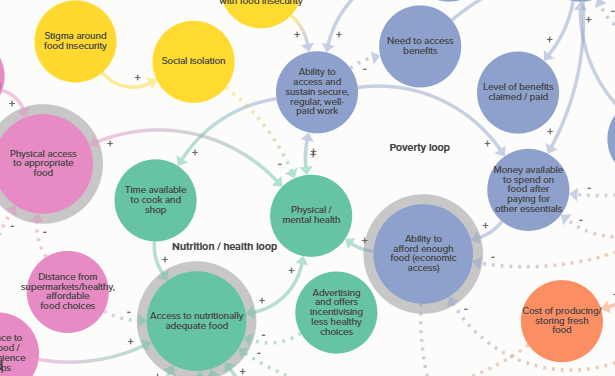Sainsbury’s sustainability team has been working with charity think tank New Philanthropy Capital (NPC) to better understand the causes and effects of food insecurity in the UK.
Their research has found that while food poverty is “fundamentally a financial issue” it is also influenced by a “complex interplay” of social and environmental factors.
Together they have created a “systems map” to better analyse the causes and consequences of food insecurity.
This looks at issues including stigma of food poverty, access to food, household income, national drivers, as well as issues around nutrition and health.
Specific issues looked at include “poverty loop” factors such as access to regular work, benefits and childcare, as well as debt to government.
Nutrition issues include available time to cook, access to nutritional food and impact of advertising that promote less healthy food.
Other work between NPC and Sainsbury’s includes staging workshops with stakeholders to better understand how Sainsbury’s can better uses its partnerships to tackle food poverty.
“Using the input from the workshops and our research, NPC developed a high-level theory of change in collaboration with Sainsbury’s Sustainability team,” explains the think tank.
“The theory of change showed how Sainsbury’s could amplify its impact in tackling food insecurity using a three-pronged approach: allocating targeted funding, developing strategic partnerships internally, and partnering with external stakeholders. We then shared the theory of change with key partners.”
It added: “NPC’s bespoke approach supported Sainsbury’s in enhancing their understanding of the drivers of food insecurity in the UK and where they as a business are well placed to act.
“This ultimately helped them advance more impactful charitable giving and community activities.”
Advice from the research for the wider food industry, government and charities includes acknowledging that while “food banks and other crisis support services are essential in providing immediate relief to those who can’t afford to eat” there is a “need to invest in interventions that provide wraparound support to individuals, such as benefits advice and mental health support”.
Latest News
-
Cardfactory funds homelessness charity’s team of psychologists
-
Bingo firm raises £300,000 for the Stroke Association
-
Sainsbury’s links up with Comic Relief for festive recipe campaign
-
Shepherd Neame extends air ambulance charity partnership
-
Businesses help festive match funder raise a record £57.4m
-
Firms help fund regional mayors' initiatives to tackle childhood inequality
© 2019 Perspective Publishing Privacy & Cookies







Recent Stories